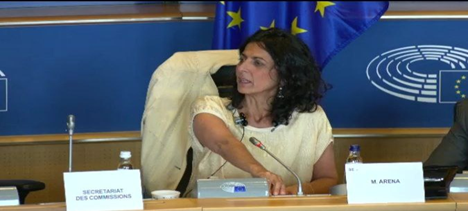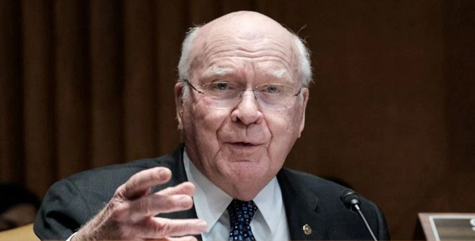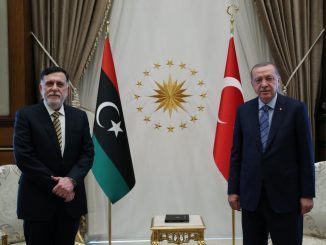
At the European Parliament, the Egyptian House of Representatives’ Human Rights Committee chairperson and the rest of the Egyptian delegation with him have recently been ‘grilled on the government’s human rights record’.
Tarek Radwan, the chairperson of the Human Rights Committee of the Egyptian House of Representatives (HoR) on 10 May appeared before the European Parliament’s Subcommittee on Human Rights, in a desperate attempt to whitewash the Sisi regime’s dire human rights record. Instead, head and members of the Egyptian delegation were grilled by EU members on the government’s horrible human rights record.
In his introductory remarks, Radwan conspicuously left out issues such as political prisoners, prison conditions, enforced disappearances, executions, and extrajudicial killings.

He instead repeated the government’s increasingly common refrain about socioeconomic conditions needing to be addressed before political rights, and he complained that Egypt has not received a “proper evaluation” from the international community.
Radwan also stressed Egypt’s role in preventing “dramatic and drastic efforts to combat terrorism and to combat illegal migration” to Europe.
Several European parliamentarians were quick to point out the issues that Radwan avoided.
Mounir Satouri, the European Parliament’s standing rapporteur on Egypt, said that Egypt cannot achieve its economic, political, and ecological goals without an improvement in democracy and human rights.
He asked why Egypt’s National Strategy for Human Rights was drafted by the Ministry of Foreign Affairs rather than the Interior Ministry—one factor that has led rights groups to deem the document a public relations exercise—and about Egypt’s shocking rate of executions.
Pierfrancesco Majorino of Italy said that the international community cannot allow the COP 27 climate conference to be hosted in a country holding tens of thousands of political prisoners, drawing particular attention to the cases of Patrick George Zaki and Ahmed Samir Santawy, both of whom were studying in Europe before their arrests in Egypt. He also asked about murdered Italian researcher Giulio Regeni.
In response, Radwan said that the Egyptian judicial system has been completely cooperative and transparent with Italian authorities in Regeni’s case—the Italian judge presiding over the case, in contrast, has said there has been “no cooperation whatsoever”—and called on parliaments and the media not to “interfere in the judicial system.”
Quizzed about Egypt’s dire prison conditions, Radwan reminded the audience that they are now called “reform centers” and invited parliamentarians to visit the prisons in person. (In a speech before the same body in January, former political prisoner Ramy Shaath said that Egyptian officials regularly show visitors areas that detainees are not even allowed to enter.)
Meanwhile, Radwan’s colleague Mohamed Abdel-Aziz, who is also a member of the newly reconstituted Presidential Pardon Committee, denied that torture or arbitrary arrests take place in Egypt.
Speaking of the Presidential Pardon Committee, the committee announced yesterday that dozens of individuals will be pardoned in the coming days.
An unidentified member of the committee added today that authorities will release approximately 35 percent of the individuals whose cases the committee considered. Some, the source said, are serving prison sentences, while others are still in pretrial detention.
The committee was also one of several groups to welcome the Sisi’s so-called “national dialogue” and confirm participation. The dialogue is being organized by the National Training Academy, a governmental body established in 2017.
However, dozens of human rights defenders, journalists, politicians, and other public figures have signed a new petition calling on authorities to take 10 steps ahead of the dialogue to “build confidence between the ruling authority and the rest of the Egyptian political and civil society components.”
Sullivan in Cairo
On the other hand, Egypt’s Abdel Fattah al-Sisi met with National Security Advisor Jake Sullivan and White House Coordinator for the Middle East and North Africa Brett McGurk in Cairo today.
Also present on the Egyptian side were Foreign Minister Sameh Shoukry and General Intelligence Services Director Abbas Kamel. According to the Egyptian readout, the two sides discussed improving bilateral relations, combating terrorism, and a number of regional issues, including the Grand Ethiopian Renaissance Dam and developments in Palestine.
However, the White House statement only indicated that they talked about “the importance of tangible and lasting human rights progress in Egypt,” Russia’s invasion of Ukraine, and “Washington’s support for Egypt’s security, food, and fuel needs.”
The White House statement read:
[National Security Advisor Jake Sullivan and National Security Council Coordinator for the Middle East and North Africa Brett McGurk traveled to Cairo, Egypt on May 10-11 to consult on a broad range of global and regional security challenges. National Security Advisor Sullivan discussed with President Abdel Fattah Al Sisi and senior Egyptian officials the global consequences of Russia’s unprovoked war against Ukraine, and Washington’s support for Egypt’s security, food, and fuel needs. The delegations also discussed coordination on regional issues, as well as the importance of tangible and lasting human rights progress in Egypt.]Al-Sisi had also welcomed General Michael Kurilla, the new head of U.S. Central Command, two days earlier. According to a senior U.S. military official, the Egyptian side sought a deeper counterterrorism relationship with the United States during that meeting.
The meetings come amidst an uptick in violence in Egypt, with militants killing five more soldiers today after another attack left 11 dead four days earlier. The military has killed 16 people in retaliatory airstrikes.



